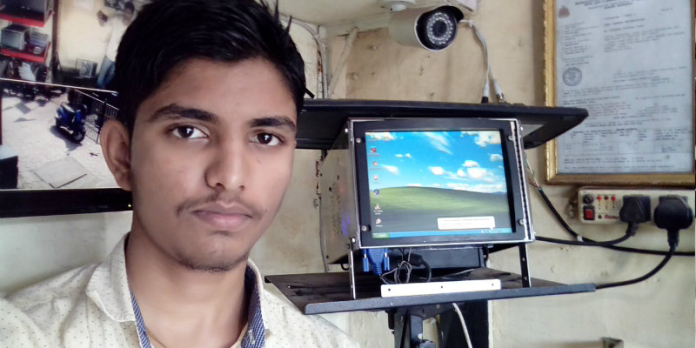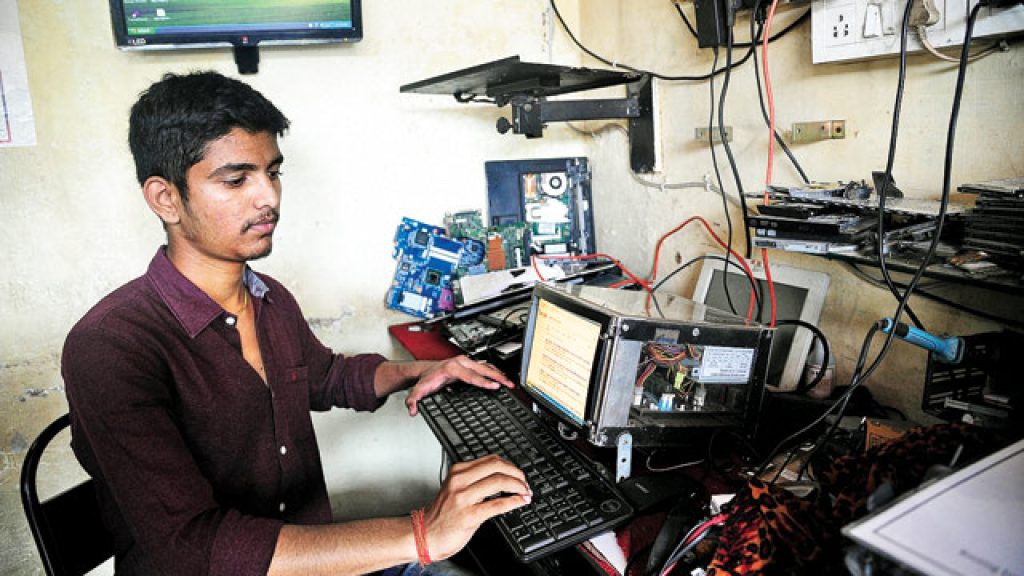
This School Dropout Makes Computer From E-waste And Scrap For Just INR 5500!
Date:

Share post:
India is the fifth-largest contributor of e-waste in the world and 82% of India’s total e-waste comprises of personal devices that include laptops and computers. How amazing it is that someone has finally cracked down a way to use the very same scrap to build re-cycled computers, thus helping us not only reduce e-waste but also effectively use it. The mind to conceive this idea is not of an engineer sitting in a laboratory, but of a 13-year-old (now 20) school drop-out son of an e-waste scrap dealer from Ghatkopar, Mumbai, Jayant Parab. It’s pleasantly shocking to believe that the computer I am writing this article from, and probably the one you are reading from could also be made from scrap waste!

Jayant says that he used a computer (the desktop version) for the first time when he was in the 3rd standard. He vividly remembers his excitement.
“We had computer classes as a part of the school curriculum and that was the first time I used a PC. Till then, the box-shaped machines had always intrigued me because I saw them everywhere I went – in offices, banks and shops. But getting the opportunity to work on one was nothing short of thrilling!”
The school started with the basics of hardware, and gradually started to teach software such as MS Office, Paint, etc. Each class imparted the knowledge that Jayant would enthusiastically unfold and explore. To him, computers meant endless possibilities. Amused by his thirst to learn computers, his father, Mr Ravindra Parab enrolled him in a local computer class where he could advance at a faster pace than the school curriculum.
“It was a month-long introductory course for beginners. While the computer classes in school introduced me to PCs, it was this course that made me confident about operating the machine”, he says to The Better India.
The course was just the beginning of his endless quest in the world of technology. While his enthusiasm could be shared by thousands of other kids inclined towards technology, it was what he thought of next that makes him stand out. Amidst his learning marathon, he was also increasingly becoming conscious of the e-waste that these machines produce. After all, he could see first-hand about it in his father’s business.
“I picked up a lot from watching my father and my brother work and, before long, I was able to assess on my own whether some pieces could be salvaged or not. My father and brother then taught me how to take the pieces apart, how to determine what was wrong with them, fix the problems, and put them back together again. The courses I attended taught me a lot about different software, but it is the hours I spent working with e-waste that helped me understand the minutest details about the functioning of PCs”, he exclaims.
His growing passion for computers compelled his father to install a second-hand computer in their home. “This allowed me to practise everything I learnt, at my own pace and on my own time. I also used the internet to learn new things, every day,” he said.

He knew how computers could contribute to a better learning experience for children. Hence, he started to impart training to neighbourhood kids free of cost. He conducted informal training sessions twice or thrice a week to expose children to this indispensable future-tech.
“I realised that many of these children had limited exposure to PCs and came from families that could not afford to buy their machines. Given how all-pervasive this technology is, I thought it was extremely important that they be well-versed in it too. I believe that people’s socio-economic status should not hold them back in life or deprive them of opportunities,” Jayant states.
When he was 13 years old, a school exhibition to make the best out of waste turned out to be a catalyst in bringing forth his innovation. He decided to participate in the exhibition. Equipped with the years of experience of studying about e-waste and teaching kids about computers, he set an ambitious goal of making an entirely working computer machine from scratch using nothing but the e-waste. Witnessing the plight of many kids who could benefit from having a computer at their homes, but couldn’t because of unaffordability, motivated him to fearlessly pursue his goal. He intended to create a computer that could not only reduce e-waste but also be affordable enough for anyone to purchase without burning their pockets.
“It was a bit of a daunting task; I had not heard of such a computer being made before, so I had no blueprint that I could follow, no tutorials I could refer to,” he admitted.
For nearly a month he juggled between his school, homework, and his passion project that commanded 4-5 hours daily. “I began by sorting through the e-waste, picking working components from the different pieces I could find, repairing the components that were broken, replacing some others… it was a tedious process,” he recalled. However, at times he was fortunate enough to find a solution easily.
“My father also collects e-waste from hospitals and he came across a broken ECG machine. When he brought it home, I picked it apart, saw that the problem with it was only minor, fixed it and upgraded it, and decided to use it as a monitor,” he explained enthusiastically.
Gradually, he put together the computer machine under the watchful eye of his father and elder brother. “I was given strict instructions to not do any heavy-duty electrical work unless my father or brother were present. They were always around to help and their support was unwavering, but they also let me figure things out on my own and didn’t push me,” he said. The outcome was a perfectly working machine with a 9-inches monitor, 2 GB RAM, and 1 GB Hard disk.
“It runs on LINUX and has inbuilt speakers, Bluetooth and Wifi. The PC can be used for work or personal use and is equipped with word processing and spreadsheet software too,” he claimed.
People were mighty impressed with his efforts, and the exhibition organizers also honoured him with a certificate. However, for Jayant, his greatest satisfaction laid in the fact that he could put together his project and display it to the world.
“The exhibition draws school children from across the city and, for me, the fact that I was able to show them that building something like this was possible, that was the real win,” he saId.
During the project, he realised that computers made from e-waste are not only environmentally friendlier but can greatly boost a rag-picker or a waste dealer’s income. However, the biggest advantage would be to those sections of society who cannot afford a computer, hence miss out on all the opportunities it has to offer.
“Imagine if we train them to properly collect e-waste, to assess the quality of the e-waste, and to repair different pieces to put them together as PCs… They could sell these machines and have an alternative source of income. What’s more, they would also be helping deal with the huge e-waste problem while making PCs affordable to a large section of society,” he explained.
Since his first trial, Jayant has made another attempt to build a second computer with improved performance and upgrades. Due to his passion for computers, regular studies did not interest him. As a result, he had to drop out of school due to failure in his 9th standard examinations. However, his education is not hampered. He gave his 10th standard examinations through correspondence and continues to dive deeper into the world of computers.
“Knowledge of computers is essential for surviving in today’s world. The first question in any job interview is whether the applicant knows how to operate a PC or not. Every single person needs to know how to use a PC,” he said. “I want to continue doing more courses and further hone my skills so that I can make a successful career in computers,” he says.
Today, Jayant successfully makes and sells his computers made from e-waste that are at par in terms of specifications with the other laptops in the market, and also come with a one-year warranty. He sources e-waste with the help of his father from commercial and residential units and builds computers with his brother. He sells them at INR 5,500 so that nobody in need of a computer is demotivated due to lack of finances. The Department of Industrial Policy and Promotion (DIPP) has promised to help Jayant in his endeavour.

Computer literacy is a fundamental necessity for employment in any field, now stressed upon more than ever due to competition and globalisation. We have no idea how many people are deprived of a better life only because they cannot afford and learn to use a computer. We hope, large corporations making computers also consciously make an effort to do away with the e-waste, and incorporate ecological measures to build their products because it is certainly possible as shown by Jayant. If he can do it with such limited resources, imagine the kind of change large companies can bring with their vast resources and expertise. We also applaud Jayant’s curiosity to learn, explore, and show the courage to execute his ideas that once seemed impossible.
We’ve pinned our hopes on innovators like Jayant who hold the promise of a better, greener, and a brighter future.
